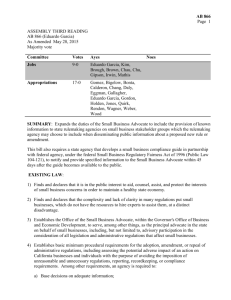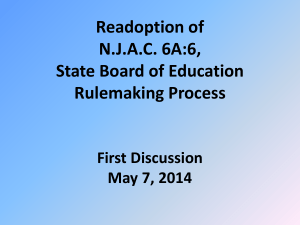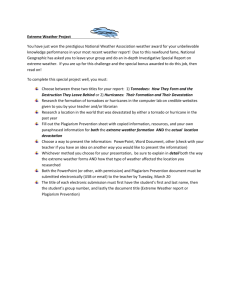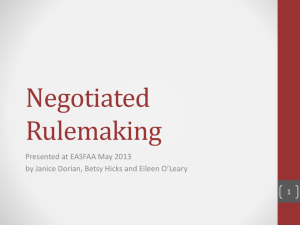Course Syllabus (POLS 471E) - California State University, Northridge
advertisement
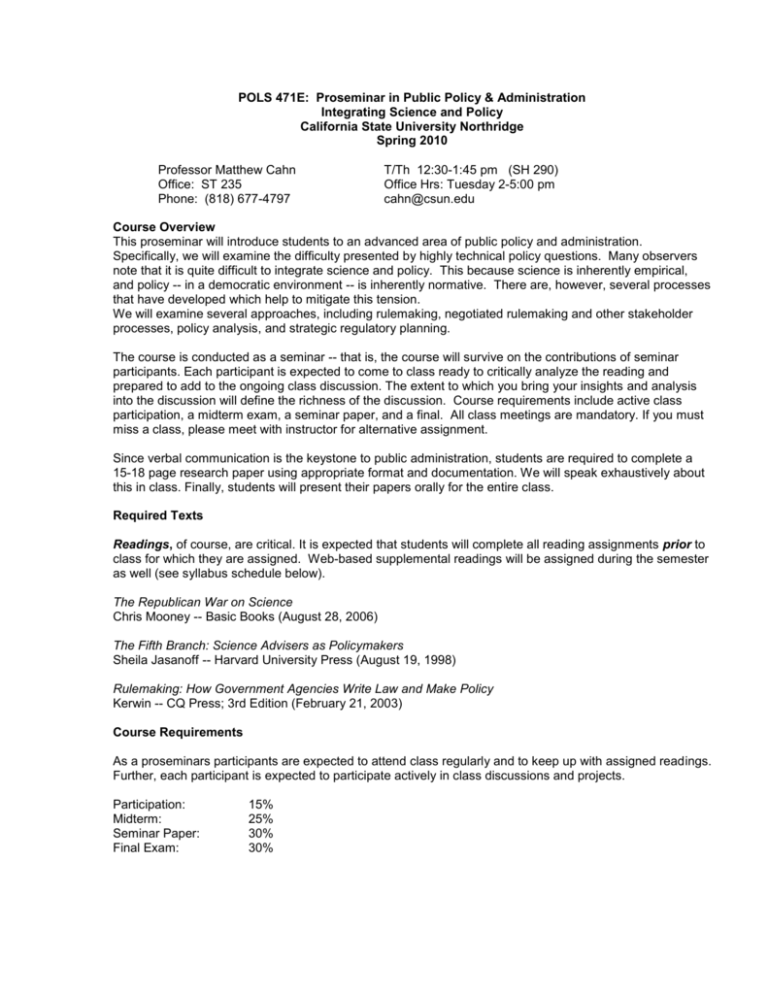
POLS 471E: Proseminar in Public Policy & Administration Integrating Science and Policy California State University Northridge Spring 2010 Professor Matthew Cahn Office: ST 235 Phone: (818) 677-4797 T/Th 12:30-1:45 pm (SH 290) Office Hrs: Tuesday 2-5:00 pm cahn@csun.edu Course Overview This proseminar will introduce students to an advanced area of public policy and administration. Specifically, we will examine the difficulty presented by highly technical policy questions. Many observers note that it is quite difficult to integrate science and policy. This because science is inherently empirical, and policy -- in a democratic environment -- is inherently normative. There are, however, several processes that have developed which help to mitigate this tension. We will examine several approaches, including rulemaking, negotiated rulemaking and other stakeholder processes, policy analysis, and strategic regulatory planning. The course is conducted as a seminar -- that is, the course will survive on the contributions of seminar participants. Each participant is expected to come to class ready to critically analyze the reading and prepared to add to the ongoing class discussion. The extent to which you bring your insights and analysis into the discussion will define the richness of the discussion. Course requirements include active class participation, a midterm exam, a seminar paper, and a final. All class meetings are mandatory. If you must miss a class, please meet with instructor for alternative assignment. Since verbal communication is the keystone to public administration, students are required to complete a 15-18 page research paper using appropriate format and documentation. We will speak exhaustively about this in class. Finally, students will present their papers orally for the entire class. Required Texts Readings, of course, are critical. It is expected that students will complete all reading assignments prior to class for which they are assigned. Web-based supplemental readings will be assigned during the semester as well (see syllabus schedule below). The Republican War on Science Chris Mooney -- Basic Books (August 28, 2006) The Fifth Branch: Science Advisers as Policymakers Sheila Jasanoff -- Harvard University Press (August 19, 1998) Rulemaking: How Government Agencies Write Law and Make Policy Kerwin -- CQ Press; 3rd Edition (February 21, 2003) Course Requirements As a proseminars participants are expected to attend class regularly and to keep up with assigned readings. Further, each participant is expected to participate actively in class discussions and projects. Participation: Midterm: Seminar Paper: Final Exam: 15% 25% 30% 30% Paper A 15-18 page paper exploring some topic related to public policy and administration is required. The paper must utilize course materials as well as appropriate additional resources. The paper should state the issue or controversy clearly and concisely; discuss the issue in the context of the disciplinary literature; evaluate our knowledge and understanding of the issue; and reach some conclusions based on that knowledge. Do not simply summarize what others have said on the issue -- evaluate their contributions in light of the evolving literature and make your own contribution. The papers should be written in a scholarly format, typed double-spaced, according to academic protocol. Remember, the paper should be analytic, not merely descriptive. The paper must use scholarly sources, including peer reviewed journals and research articles. A Note About Plagiarism Plagiarism is a growing problem in the university. The university, and the MPA Program, takes plagiarism very seriously. The university catalog defines plagiarism as intentionally or knowingly representing the words, ideas, or work of another as one's own in any academic exercise. University policy states that cheating or plagiarism in connection with an academic program is an offense for which a student may be expelled, suspended, or given a less severe disciplinary sanction. This can be avoided in the following ways: 1. Direct Quotation: Every direct quotation must be identified by quotation marks, or by appropriate indentation or by other means of identification, and must be promptly cited in a footnote. Proper footnote style for any academic department is outlined by the MLA Style Sheet or K. L. Turabian's A Manual for Writers of Term Papers, Theses and Dissertations. These and similar publications are available in the Matador Bookstore and at the reference desk of the Oviatt Library. [See also: Online Style Guides] 2. Paraphrase: Prompt acknowledgment is required when material from another source is paraphrased or summarized in whole or in part in your own words. To acknowledge a paraphrase properly, one might state: "to paraphrase Locke's comment . . ." and conclude with a footnote identifying the exact reference. A footnote acknowledging only a directly quoted statement does not suffice to notify the reader of any preceding or succeeding paraphrased material. 3. Borrowed Facts or Information: Information obtained in one's reading or research which is not common knowledge among students in the course must be acknowledged. Examples of common knowledge might include the names of leaders of prominent nations, basic scientific laws, etc. Materials which contribute only to one's general understanding of the subject may be acknowledged in the bibliography and need not be immediately footnoted. One footnote is usually sufficient to acknowledge indebtedness when a number of connected sentences in the paper draw their special information from one source. When direct quotations are used, however, quotation marks must be inserted and prompt acknowledgment is required. Any student found to have plagiarized any portion of submitted work will receive an F for the class, and will be referred to the Office of Student Affairs for further disciplinary action. All papers turned into this class may be run through Turnitin.com, a university endorsed plagiarism checker. The program identifies any material in a paper that may have previously appeared in published or web form. You will be required to submit papers in both hard copy and electronic form. RESOURCES to Avoid Plagiarism: http://library.csun.edu/Research_Assistance/plagiarism.html http://gervaseprograms.georgetown.edu/hc/plagiarism.html#They http://www.northwestern.edu/uacc/plagiar.html If you have any questions about plagiarism please bring them up in class or see me. Course Outline (reading must be done prior to day assigned) PART I: THE POLITICS OF SCIENCE Week I (1/19-21): Introduction http://www.ucsusa.org/scientific_integrity/abuses_of_science/a-to-z-guide-timeline.html; http://www.ucsusa.org/assets/documents/scientific_integrity/Federal-Science-and-the-Public-Good-12-08Update.pdf Week II (2/26-28): The War on Science Mooney: The Republican War on Science pp. 1-170 Week III (2/2-4): The War on Science (continued) Mooney: The Republican War on Science pp. 170-270 NO CLASS 2/9 – Cahn is on Furlough Week IV (2/11): The Role of Science in Policy Jasanoff: The Fifth Branch: Science Advisers as Policy-Makers chs. 1-4 Week V (2/16-18): The Role of Science in Policy (continued) Jasanoff: The Fifth Branch: Science Advisers as Policy-Makers chs. 5-8 Week VI (2/23-25): The Role of Science in Policy (continued) Jasanoff: The Fifth Branch: Science Advisers as Policy-Makers chs. 9-11 NO CLASS 3/2 – Cahn is on Furlough Week VII (3/4): Midterm Exam PART II: THE SCIENCE OF POLITICS Week VIII (3/9-11): Formally Accommodating Technical Information: APA Administrative Procedures Act: http://www.archives.gov/federal-register/laws/administrative-procedure/ Becker: "Science, Democracy, and Legitimacy" (online) Kerwin: Rulemaking: How Government Agencies Write Law and Make Policy -- chs. 1-2 Week IX (3/16): Rulemaking (continued) Kerwin: Rulemaking: How Government Agencies Write Law and Make Policy -- chs. 2-4 NO CLASS 3/18 – Cahn is on Furlough Week X (3/23-25): Rulemaking (continued) Kerwin: Rulemaking: How Government Agencies Write Law and Make Policy -- chs. 5-7 Week XI (3/30): Negotiated Rulemaking Negotiated Rulemaking Factsheet (EPA): http://www.epa.gov/ogcadr01/factsheetregneg.pdf Negotiated Rulemaking Act: http://www.archives.gov/federal-register/laws/negotiated-rulemaking/ "Negotiated Rulemaking in Practice" (1985): http://www.jstor.org/stable/3323257 Coglianese: ASSESSING CONSENSUS: http://www.jstor.org/stable/1372989 THE PROMISE AND PERFORMANCE OF NEGOTIATED RULEMAKING Assessing the Assessors: The Actual Performance of Negotiated Rulemaking -- Philip J. Harter: http://www3.law.nyu.edu/journals/envtllaw/issues/vol9/1/v9n1a2.pdf Coglianese: ASSESSING THE ADVOCACY OF NEGOTIATED RULEMAKING: A RESPONSE TO PHILIP HARTER http://www3.law.nyu.edu/journals/envtllaw/issues/vol9/2/v9n2a4.pdf NO CLASS 4/1 – Cahn is on Furlough SPRING BREAK 4/5-10 PART III: CASE STUDIES Week XII (4/13-15): Marine Protected Areas Stakeholder Participation: A SYNTHESIS OF CURRENT LITERATURE (online) Marine Protected Area Process Review: Case Studies of Five MPA Establishment Processes (online) Integrating Science into the Design of the Tortugas Ecological Reserve (online) History of the Channel Islands Marine Reserves Working Group Process (online) Week XIII (4/20-22): Siting Nuclear Waste Public Attitudes Toward a High Level Nuclear Waste Repository in Nevada http://opim.wharton.upenn.edu/risk/downloads/archive/arch73.pdf RESOLUTION REAFFIRMING ITS OPPOSITION TO THE SITING OF A NUCLEAR WASTE REPOSITORY http://www.accessclarkcounty.com/depts/comprehensive_planning/nuclearwaste/Documents/Resolution030 502.PDF Yucca Mountain Licensing Process http://www.nei.org/keyissues/nuclearwastedisposal/factsheets/yuccamountainlicensingprocess/ DOE Approves Nevada Nuclear Waste Site http://usgovinfo.about.com/library/weekly/aa011202a.htm How Safe is Yucca Mountain? http://docs.nrdc.org/nuclear/nuc_08010701A.pdf Controversy Over Yucca Mountain May Be Ending http://www.washingtonpost.com/wp-dyn/content/article/2009/03/03/AR2009030303638.html A Lifetime of Work Gone to Waste? (online) Dan Charles Science 20 March 2009: 1557 http://www.sciencemag.org.libproxy.csun.edu:2048/cgi/content/full/323/5921/1557 What Now for Nuclear Waste? (online) Wald, Matthew L., Scientific American, 00368733, Aug 2009 Week XIV (4/27-29): Presentations (sign up in class) Week XV (5/4-6): Presentations (sign up in class) Final Exam -- MAY 13, 2010 12:45 PM - 02:45 PM
